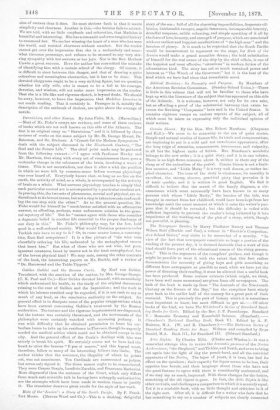Darwinism, and other Essays. By John Fiske, M.A. (Macmillan.) —Most
of Mr. Fisko's essays are reviews, and some of them reviews of books which are not well known on this side of the Atlantic. The first is an original essay on "Darwinism," and it is followed by three reviews of works on the same subject by Mr. St. George Mivart, Dr. Bateman, and Dr. Btichner. A "Crumb for the Modern Symposium" deals with the subject discussed in the Nineteenth Century, " The Soul and the Future Life." The chief point made may be gathered from the following extract :—" I agree with Professor Huxley and Mr. Harrison, that along with every act of consciousness there goes a molecular change in the substance of the brain, involving a waste of tissue. This is not materialism, nor does it alter a whit the position in which we were left by common-sense before nervous physiology was ever heard of. Everybody knows that, so long as we live on the 'earth, the activity of mind, as a whole, is accompanied by the activity of brain as a whole. What nervous physiology teaches is simply that each particular mental act is accompanied by a particular cerebral act. In proving this, the two sets of phenomena, mental and physical, are re- duced each to its lowest terms, but not a step is taken towards confound- ing the one stop with the other." As to the general question, Mr. Fiske would for himself be "much bettor satisfied with an affirmative Answer, as affording, perhaps, some unforeseen solution to the gene- ral mystery of life." But he "cannot agree with those who consider a dogmatic belief in another life essential to the proper discharge of our duty in this." Mr. Flake's philosophy may, for the few, hold good in a well-ordered society. What would Christian peasants under Turkish rule have to say to it P Or, to come nearer home, a consufnp- iive, East-End sempstress ? It is a fine picture of "the wise man cheerfully ordering his life, undaunted by the metaphysical snares that beset him." But what of those who are not wise, but poor, ignorant creatures, beset by snares not in the least metaphysical, but of the lowest physical kind ? We may note, among the other contents -of the book, the interesting papers on Mr. Buckle, and a review of "Dr. Hammond and the Table-Tippers."


































 Previous page
Previous page